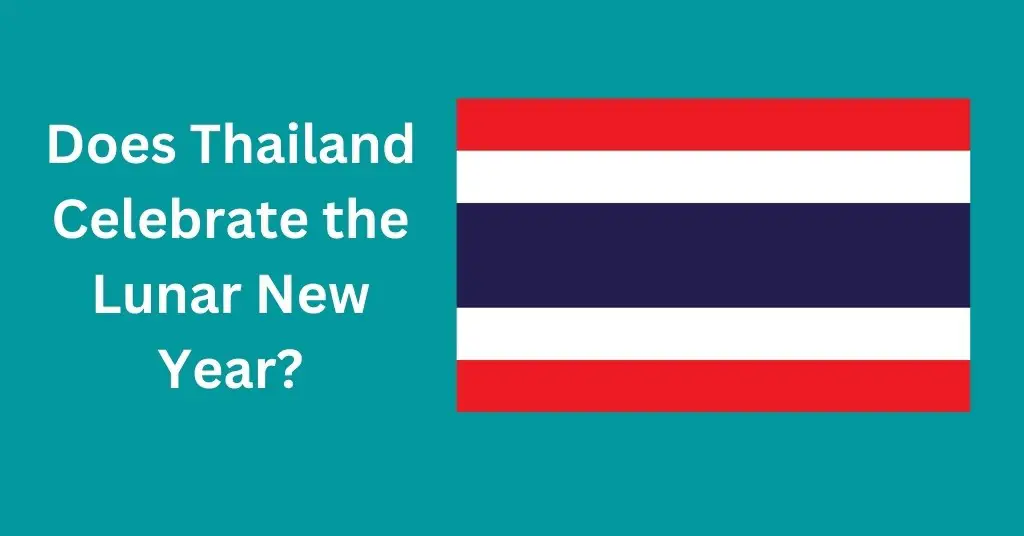Thailand does celebrate the lunar new year, especially in parts of the country with a sizeable Chinese population.
A new year is a big deal in Thailand, just like any other place in the world. It’s a massive country-wide celebration that draws hundreds of thousands of people.
One may wonder why it’s called the lunar new year. The term “lunar” signifies a connection with the moon.
The lunar new year is based on the moon’s movement, hence the name. It has its roots in China.
In this article, we’re going to explore why Thailand celebrates the lunar new year. We will also see its origins and how Thai people celebrate it.
When Does Thailand Celebrate The Lunar New Year?

January and February are the months in which the lunar new year can fall. There’s no fixed date, and the second new moon after the winter solstice is considered the lunar new year.
As the name suggests, the lunar new year follows the moon’s cycle and is not related to the Gregorian calendar.
The Chinese calendar, on which the lunar new year is based, has months represented by one of twelve animals. 2022 is the year of the tiger, and 2021 was the year of the Ox.
Dates for the upcoming five Lunar New Years in Thailand :
| Year | Day | Date | Animal |
| 2023 | Sunday | 22nd of January | Rabbit |
| 2024 | Saturday | 10th of February | Dragon |
| 2025 | Wednesday | 29th of January | Snake |
| 2026 | Tuesday | 17th of February | Horse |
| 2027 | Saturday | 6th of February | Goat |
The lunar new year is not an official holiday in Thailand, with most government buildings remaining operational on the day. Most shops, too, will remain open on the day, making this a great time to visit the country.
However, there are four provinces of Thailand that recognize the lunar new year as an official holiday – Pattani, Satun, Narathiwat, and Yala.
How Do People Celebrate The Lunar New Year In Thailand?
Here are some of the ways the locals celebrate the lunar new year. These also double up as things to do in Thailand on this occasion.
1. Visiting Bangkok’s Chinatown (Yaowarat)
Since it’s a Chinese holiday, Chinatown in Bangkok is the hub for all lunar new year celebrations. The occasion promises a spectacle and feast for all five human senses.
The streets are decorated with lanterns, lights, banners, etc.
Parades, firecrackers, and performers are some of the fantastic attractions one can witness in Yaowarat.
Chinatown is famous for its cuisine, and it’s extra special on occasions such as this. Odeon Gate is the place to be in Bangkok on the lunar new year.
2. Wearing Red
Red is the color of the lunar new year or the Chinese new year in Thailand. It is considered auspicious in Chinese culture.
You will see people donning their red outfits, locals, restaurant owners, staff, etc.
Join in the celebrations by wearing red on this fantastic occasion.
The red theme also extends to the banners, motifs, and overall street decorations.
3. Eating the Yu Sheng Delicacy
Yu Sheng is a delicacy consumed in the new year and has roots in China. It’s a raw fish salad topped with various sauces and condiments.
The dish is a symbol of prosperity and abundance. The locals consume Yu Sheng with the spirit of starting the new year with a bang and good fortune.
You can find this delicacy in most of the Chinese restaurants in Bangkok.
Does The Thai Lunar Year Have Chinese Origins?
The Lunar new year in Thailand does indeed have its roots in China. Around 15% of Thailand’s population has Chinese origins.
Thailand celebrates the lunar new year with a large population of Chinese descent.
These Thai-Chinese have stuck by their heritage and brought many Chinese traditions to Thailand along with them. The Lunar New Year is one such tradition.
The lunar new year is celebrated country-wide in Thailand. The citizens, especially the ones with Chinese heritage, try to come together for this momentous occasion.
Some of the critical elements of its celebration revolve around the color red, fireworks, dances, and lanterns.
Why Does Thailand Celebrate Songkran?
The traditional new year celebration in Thailand is called Songkran. It symbolizes gratitude, joy, and goodwill.
It’s a spring festival that draws in millions and is known as the water-splashing festival. Songkran in Thailand is between the 13th and 15th of April.
Songkran has its roots in the Sanskrit word “samkrant,” which translates to passing or stepping forward. The new year falls in line with the Hindu and Buddhist calendars.
The day used to follow the lunar calendar, but now it has a set date. It’s a celebration to welcome the end of the difficult dry months in Thailand.
People celebrate Songkran by hurling water at each other on the streets. This is, however, the rowdier side of the new year.
Many people still celebrate Songkran the old-fashioned way. This involves cleaning the house and visiting the temple for blessings and luck for the new year.
Songkran shares its occasion with different new year’s days in South and South-East Asia. This includes India, Sri Lanka, Laos, Myanmar, Cambodia, and even the Yunnan Province of China.
Final Remarks
This article covered the Thai lunar new year, when it happens, and how it’s celebrated. We also covered how this auspicious occasion has its roots in China.
Thailand celebrates the lunar new year, based on the Chinese calendar, as it has a sizable Chinese population. It’s an official holiday in four provinces, and the celebration draws in many people from around the country.
Does Thailand celebrate the lunar new year? Yes, it’s a big celebration in the country. It falls in January and February – the second new moon after the Winter Solstice.

My name is Jeyn Dashner and I am the founder of WanderFever. I have worked as a travel journalist for many years, and exploring new places is my greatest pleasure in life.

